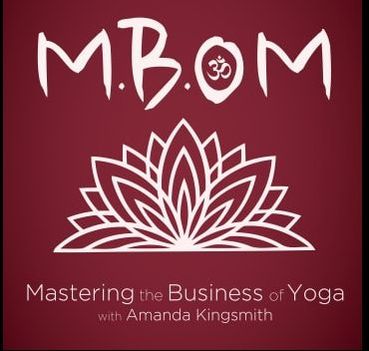 I had the absolute pleasure of talking about what it means to embody Yoga, Teach Kids and lead Successful Retreats with the amazing Amanda Kingsmith. Her podcast M.B.Om offers Yoga professionals a real look behind the scenes into the business aspect of the Yoga industry. Click here to listen to the interview
0 Comments
3/22/2018 0 Comments Join up the Dots w/ David Ralph
I had a wonderful time discussing Business, Niches, Following your passion, entrepreneurship and so much more with the fantastic David Ralph on the "Join up the Dots" Podcast. Take a listen below:
3/22/2018 0 Comments Laughter Yoga...is REAL!!by Awilda Rivera Originally published in Sept. 2016 In Aquarius Magazine for her long running column "Under The Bodhi Tree" under the heading 'Yoga and Change'
3/8/2018 0 Comments A Closer Look: Contentmentby Awilda RiveraOriginally published in Jun. 2016 In Aquarius Magazine for her long running column "Under The Bodhi Tree" For many Yoga consists of going to a studio to move mindfully, taking time to just be on the mat, in the moment without judgment. For some there is no interest in intellectualizing Yoga through study of its ancient philosophies or the methods at its core. Yet for others, there can be no mindful movement without also engaging in a dedicated study of ancient Yogic philosophies. You might wonder: Can the person who simply enjoys doing yoga asana have a complete yoga practice without studying its ancient philosophical roots?
The quick answer is: Yes! Yoga does not discriminate; it is for everyone. Each person comes to Yoga looking for something different, and ultimately finds what they need. There is no right or wrong way to approach it. The truth is that the person who comes to yoga to move mindfully & simply be is experientially learning Yogic philosophy. The root of the word Yoga is Yug, it means to yoke together as one. Yoga is about creating a complete unity of mind, body & spirit that organically produces contentment. In yoga philosophy there are ten (10) fundamental principles that help to inform one’s interactions both with the world[1] and with themselves[2]. Contentment is one of the principles that relates to how you interact with yourself.[3] Contentment is categorized by ones ability to be present in the moment without judgment of yourself or others, while detached from past or future outcomes. People find contentment through their yoga practice in many ways. Some people find contentment in just being on the mat doing yoga, others find contentment through the combination of movement and deeper study of Self through the lens of Yoga[4]. Ultimately regardless of the category you are in, both groups can produce individual who find contentment easier to attain off of the mat because of the contentment they have cultivated on the mat. When I first began practicing Yoga I was contented to simply be on my mat breathing, present in the moment. However, I was unable to hold onto that contentment once outside the studio. As soon as I got into the hallway or into my car all my responsibilities and cares would resurface, rushing to the forefront of my mind. I would allow myself to be overwhelmed with frustration, until I decided that if I allowed myself to be ok with being able to reach a state of clam during the class, then I could be content. After almost a year, I wanted to understand more of the why of Yoga so I decided to read BKS Iyengar’s “Tree of Yoga”. As I read, I started to feel more energetically connected to the physical movements and the moments of solace I was finding on the mat during class. As I read, the internal desire to take the contentment I found on the mat into the world began to grow. I realized I didn’t have to limit my contentment to confines of a studio or moment during class, I could be contentment whenever I wanted for whatever reason I wanted. I began to proactively apply the same ideas of balance, breath, and contentment to everyday situations that would have otherwise lead to anxiety or anger. Initially it was extremely challenging to breathe through a moment of anger, hold my perspective in a positive space and take action from a place of calm compassion. However, after a lot of practice it has become easier, while I am not perfect I am able to more easily identify: why I am, when I became, and how long I feel like remaining upset or anxious. Accidentally cultivating contentment through Yoga has only had a beneficial effect on my life. Becoming aware of cultivating contentment has resulted in the realization that contentment begins within me. Contentment directly relates to your perspective, it does not require that you be complacent or simply accept life passively but it demands an awareness of self and individual choice. Therefore, whether you study the philosophy or simply like to show up to move mindfully, as long as you are allowing yourself to be present in the moment without judgment of yourself or others, while detached from past or future outcomes, then you will experience a complete yoga practice. Not sure what the end goal of all this contentment is? Pantajali educates us that “[f]rom Contentment one gains Supreme Happiness.” [5] Not sure you believe him? Take a crack at it over the next month and see if your happiness quotient increases. [1] Yamas – Set of 5 priniciples that help to dictate how one should interact with the world [2] NiYama – set of 5 priniciples that help to dictate how one should treat themselves [3] Santosha in Sanskrit [4] Svadhaya – the yogic principle of Self Study encourages that one utilize yoga as an opportunity to dive deep within to learn more about yourself [5] Yoga Sutras of Pantajali: As interpreted by Makunda Stiles; Sutra II, 42; p. 27 |
Knowledge Share:
|
Welcome! I am so glad you found this area of my site! It is my intention to share a tone of awesome free content with you all here. Feel free to comment, email or share posts that you enjoy! Thanks for visiting!**All blogs written by Awilda Rivera, unless otherwise indicated therein. |
Categories
All Infographic Personal Management Podcast Interviews Professional Development Success Coaching Time-ninja-series Under-the-bodhi-tree Yoga |
Archives
July 2019
|

 RSS Feed
RSS Feed